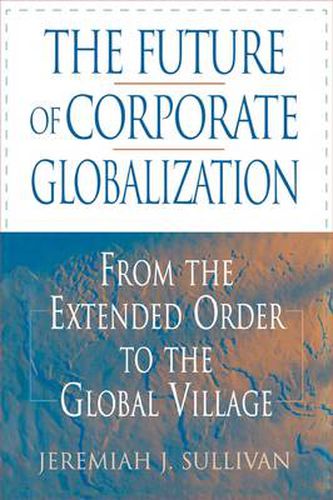Readings Newsletter
Become a Readings Member to make your shopping experience even easier.
Sign in or sign up for free!
You’re not far away from qualifying for FREE standard shipping within Australia
You’ve qualified for FREE standard shipping within Australia
The cart is loading…






Imparts survival skilis for corporations during the paradigm battle of the 21st century: the capitalist market model vs. the Global Village. As the new century progresses, it will undoubtedly be characterized by more paradigm shifts than we can imagine. But one such shift is already discernable because it is well under way, although the outcome is not yet clear. The shift appears to be away from the capitalist market model, referred to here as the extended order, which has given rise to the forces of globalization that support the way multinational corporations do business, and toward the Global Village model based on justice, virtue, stability, and national sovereignty. This Global Village paradigm, the author contends, is emerging out of the opposition to globalization. The author explains how and why this paradigm shift may occur and describes the likely impact on the way corporations conduct themselves, both internally and externally. Globalization poses challenges not only to corporations, but to its own continuance. It sows the seeds of its own potential demise by creating the conditions for opposition. This self-perpetuating momentum allows the author to argue cogently and realistically that the opposition is becoming strong enough to be taken seriously, and that companies that ignore the growing chorus of discontent with globalization do so at their peril. Those who pay attention and learn how to adapt to the new realities of the coming decades will be well rewarded for their efforts, for they will not merely survive but also prosper. As the Global Village paradigm gains momentum, Sullivan demonstrates that we can expect it to lead to the following changes in international business Corporate governance bodies will increasingly include NGO representatives and employees. Justice, stability, virtue, and national cultural identity will become corporate goals, alongside the profit motive. Customer relationships will become enriched by mutual obligations and trust. Risky global corporate strategies will have less appeal than more stable avenues of action. Employee relations will increasingly take into account workers’ growing desire for meaningful labor whose rewards entail more than financial remuneration. Managers will become more like public servants and less like independent agents. The persistence of these trends–accelerated by new ideas about the nature of work and by the growing power of the Internet to bring far-flung activists together in pursuit of common goals–threaten the existing order as never before. This book provides detailed lists of adaptations that corporations need to make now to protect their roles in the future.
$9.00 standard shipping within Australia
FREE standard shipping within Australia for orders over $100.00
Express & International shipping calculated at checkout
Imparts survival skilis for corporations during the paradigm battle of the 21st century: the capitalist market model vs. the Global Village. As the new century progresses, it will undoubtedly be characterized by more paradigm shifts than we can imagine. But one such shift is already discernable because it is well under way, although the outcome is not yet clear. The shift appears to be away from the capitalist market model, referred to here as the extended order, which has given rise to the forces of globalization that support the way multinational corporations do business, and toward the Global Village model based on justice, virtue, stability, and national sovereignty. This Global Village paradigm, the author contends, is emerging out of the opposition to globalization. The author explains how and why this paradigm shift may occur and describes the likely impact on the way corporations conduct themselves, both internally and externally. Globalization poses challenges not only to corporations, but to its own continuance. It sows the seeds of its own potential demise by creating the conditions for opposition. This self-perpetuating momentum allows the author to argue cogently and realistically that the opposition is becoming strong enough to be taken seriously, and that companies that ignore the growing chorus of discontent with globalization do so at their peril. Those who pay attention and learn how to adapt to the new realities of the coming decades will be well rewarded for their efforts, for they will not merely survive but also prosper. As the Global Village paradigm gains momentum, Sullivan demonstrates that we can expect it to lead to the following changes in international business Corporate governance bodies will increasingly include NGO representatives and employees. Justice, stability, virtue, and national cultural identity will become corporate goals, alongside the profit motive. Customer relationships will become enriched by mutual obligations and trust. Risky global corporate strategies will have less appeal than more stable avenues of action. Employee relations will increasingly take into account workers’ growing desire for meaningful labor whose rewards entail more than financial remuneration. Managers will become more like public servants and less like independent agents. The persistence of these trends–accelerated by new ideas about the nature of work and by the growing power of the Internet to bring far-flung activists together in pursuit of common goals–threaten the existing order as never before. This book provides detailed lists of adaptations that corporations need to make now to protect their roles in the future.